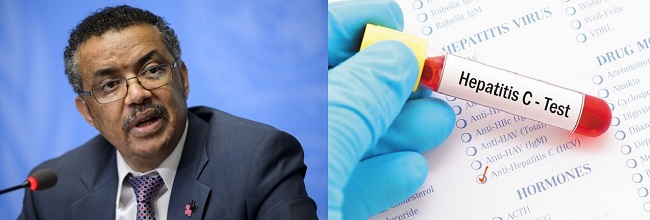World Hepatitis Day: WHO Releases Mind Boggling Figures
Today is World Hepatitis Day, with the World Health Organisation urging all countries and partners to promote the theme “Invest in eliminating hepatitis”.
WHO today called on countries to take advantage of recent reductions in the costs of diagnosing and treating viral hepatitis and scale up investments in disease elimination.

Blood sample with requisition form for hepatitis C virus test
According to WHO, Viral hepatitis B and C affect 325 million people worldwide causing 1.4 million deaths a year.
It is the second major killer infectious disease after tuberculosis, and nine times more people are infected with hepatitis than HIV.
Hepatitis is preventable, treatable, and in the case of hepatitis C, curable. However, over 80% of people living with hepatitis are lacking prevention, testing, and treatment services.

Tedros Adhanom Ghebreyesus: WHO director-general
A total of US$58.7 billion is needed to eliminate viral hepatitis as a public health threat in these 67 countries by 2030. This means reducing new hepatitis infections by 90% and deaths by 65%.
“Today 80% of people living with hepatitis can’t get the services they need to prevent, test for and treat the disease,” said WHO Director-General Dr. Tedros Adhanom Ghebreyesus.
“On World Hepatitis Day, we’re calling for bold political leadership, with investments to match. We call on all countries to integrate services for hepatitis into benefit packages as part of their journey towards universal health coverage.”
By investing in diagnostic tests and medicines for treating hepatitis B and C now, countries can save lives and reduce costs related to the long-term care of cirrhosis and liver cancer that result from untreated hepatitis.
New WHO data from 28 countries – representing approximately 70% of the global hepatitis burden – indicate that efforts to eliminate hepatitis are gaining momentum. Published to coincide with World Hepatitis Day, the data reveal that nearly all 28 countries have established high-level national hepatitis elimination committees (with plans and targets in place) and more than half have allocated dedicated funding for hepatitis responses.
“It is encouraging to see countries turning commitment into action to tackle hepatitis,” said Dr. Tedros Adhanom Ghebreyesus, WHO Director-General. “Identifying interventions that have a high impact is a key step towards eliminating this devastating disease. Many countries have succeeded in scaling-up the hepatitis B vaccination. Now we need to push harder to increase access to diagnosis and treatment.”




